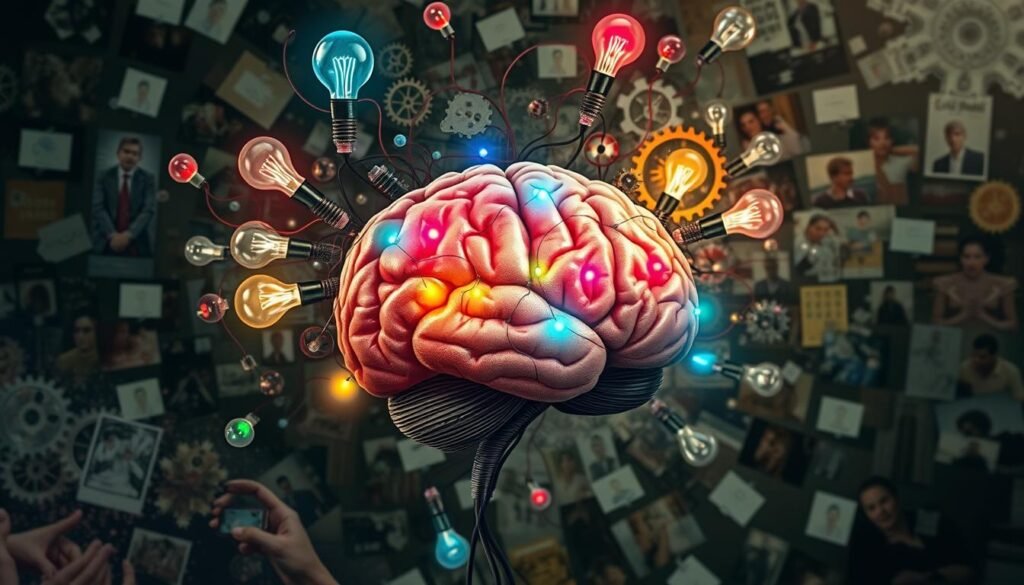Did you know we make about 35,000 decisions every day? This huge number shows why many feel mentally tired. Making choices, from picking breakfast to big life changes, can wear us down. Dr. MacLean says that decision fatigue can make us feel overwhelmed and anxious, especially during tough times like the COVID-19 pandemic. When we face too many choices, it’s harder to make good ones. This can make us stuck in a cycle of decision fatigue.
By understanding decision fatigue, we can better control our focus and energy. This helps us make smarter choices more easily.
Key Takeaways
- Decision fatigue is a form of mental exhaustion due to daily choices.
- People can make around 226.7 food-related decisions alone each day.
- Stress and poor mental health significantly contribute to decision fatigue.
- Recovery from decision fatigue typically occurs within a day.
- Preventative measures include delegating decisions and managing stress.
- Decision fatigue affects various aspects of life and work.
Understanding Decision Fatigue
Decision fatigue happens when you make decisions for a long time, lowering their quality. Every day, people make around 35,000 choices. This eventually wears out their thinking power. A study involving over 1,000 parole choices showed this. Judges favored prisoners seen early in the day more. Those seen late had less than a 10% chance of parole. This shows how too many decisions drain our thinking.
John Tierney says making decisions has a biological cost. It uses up mental energy. This can lead to frustration, avoiding decisions, or letting others decide. To avoid this, make big decisions early, use decision-making aids, or set routines for simple choices.
Knowing when you’re suffering from decision fatigue helps. It leads to quick or delayed decisions when your mind is tired. Creating routines and reducing minor choices saves mental power. Breaks also help refresh your decision-making ability.
In terms of stress and wellness, accepting good enough choices is beneficial. Take care of yourself and focus on key decisions to fight decision fatigue. Snacks with glucose help keep your decision-making sharp. Learning about decision fatigue’s effects and causes can hugely improve life. For more info, check out this analysis of decision fatigue. Also, explore causes of tiredness in this detailed overview on fatigue causes.
What Causes Decision Fatigue?
Many things lead to causes of decision fatigue. People make about 35,000 decisions daily. This can tire the mind greatly. Stress is also a big factor; it can make it hard to decide wisely, causing more tiredness and stress.
Mental health issues can make this worse. Those with mental health problems may find it especially hard to choose. Also, being generally tired from daily tasks can make decision fatigue worse. This can lead to fast decisions and lower performance.
The idea of ego depletion suggests making decisions uses up brain power. Studies show this effect might change based on how people see their willpower limits. Those who feel their decisions weigh heavily on them may face more decision fatigue. This is common in high-stress jobs like nursing or law.
The effect of stress on making choices is clear in high-pressure jobs. Judges or credit officers may show biased thinking, conflict in decision-making, and regret. As stress builds, focusing becomes harder. This increased mental tiredness can cause putting off important decisions or avoiding them.
Signs and Symptoms of Decision Fatigue
Knowing the signs of decision fatigue is key. It helps in dealing with its effects on daily life. People may show symptoms that point to this mental exhaustion. Missing these signs can make decision-making worse, lowering life satisfaction.
Inability to Focus or Concentrate
Not being able to focus is a major sign. After making many decisions, it’s hard for people to concentrate on just one thing. This overload makes it tough to process information, which makes deciding even harder.
Lack of Emotional Regulation
Decision fatigue can also mess with emotions. Feeling overwhelmed can make someone irritable or frustrated. This can make deciding even more difficult.
Increased Procrastination
Procrastination is a common sign of decision fatigue. Even small decisions seem too big, leading to avoidance. This not only hits productivity but also increases stress.
Feeling Overwhelmed
Feeling too overwhelmed is a clear sign of decision fatigue. Too many choices can freeze a person, making them avoid decisions. This worsens procrastination.

| Signs | Description |
|---|---|
| Inability to Focus | Struggling to concentrate due to mental overload. |
| Lack of Emotional Regulation | Feeling irritable and frustrated, impacting decision-making. |
| Increased Procrastination | Delaying small decisions, leading to avoidance behavior. |
| Feeling Overwhelmed | Mental exhaustion resulting in decision paralysis. |
The Science Behind Decision Fatigue
The science of decision fatigue looks at how making decisions affects our brains. Studies show that deciding things uses a lot of mental energy, leading to something called ego depletion. An example is judges who are more likely to say yes to parole in the morning, at 70%, than in the late afternoon, at less than 10%. This shows how making choices all day can tire out our brains.
In business, as people make decisions all day, their forecasting gets less accurate. They start guessing rather than thinking deeply, which can lead to worse decisions. Shopping too much also makes people do worse on tests of willpower. This shows a link between making lots of choices and having less brain power for other things.
Successful people have tips for dealing with decision fatigue. They automate small decisions so they can focus on bigger ones. Barack Obama wore the same colored suits every day to lessen the number of choices he had to make. The idea is, the more choices you make, the tougher each one gets. This shows even smart people can struggle with too many decisions.

Did you know that having some sugar can actually help your brain during decision fatigue? Research has found that it improves how you make decisions. However, decision fatigue can make you biased and lead to bad choices. Knowing about behavioral science can help organizations and individuals fight against decision fatigue. This can lead to more money made and happier users.
To beat decision fatigue, it’s important to know what slows down decision-making. Things like sticking to a routine and having fewer choices help keep your mind clear and improve the quality of decisions. Understanding decision fatigue helps people and companies use their brains better.
| Study | Findings |
|---|---|
| Judges’ Parole Decisions | 70% grant rate in the morning vs. |
| Business Forecasters | Accuracy declines as the day progresses |
| Shopping Decisions | Affected willpower test scores after multiple decisions |
| Barack Obama’s Strategy | Wore same color suits to reduce choices |
| Glucose and Decision-Making | Sugary snacks aid cognitive performance |
Impact of Stress on Decision Fatigue
Stress greatly affects our ability to make decisions. It unsettles our mental and physical health. When we’re overly stressed, it’s harder to choose wisely. This adds to our fatigue and lowers our ability to think clearly. Understanding the link between stress and decision fatigue helps us find ways to cope better.
General Fatigue or Exhaustion
Constant stress and activity exhaust our bodies and minds. This type of chronic stress harms our thinking and decision-making. If we’re always tired, it’s hard to think and choose well.
To feel better, it’s vital to drink water, eat healthy, and sleep enough. A helpful lifestyle can make a big difference. Small changes in daily habits can boost our health and decisions.
Effects of Poor Mental Health
Bad mental health makes decision-making tougher. Stress and decision fatigue change how we see our choices. This can lead to wrong decisions. Stress increases anxiety and this makes decision fatigue worse.
Writing in a journal can ease stress and better our mental health. Deep breathing and being mindful also help clear our mind. Staying connected with supportive friends or family helps us through hard choices.

How Decision Fatigue Affects Everyday Choices
Decision fatigue impacts our daily choices, changing how we handle decisions big and small. This impact of decision fatigue is seen in many areas, leading to less ideal choices. For example, picking out clothes can become too much because of cognitive overload. This can make people fall back on easy choices or make quick decisions.
Famous people like Barack Obama and Mark Zuckerberg have found ways to deal with this issue. Obama wore the same two styles of suits, while Zuckerberg sticks to his grey t-shirt every day. They simplify their options to save mental energy for bigger issues.
Studies show that our ability to make decisions wears down over time. As it fades, the quality of our choices can drop. This is especially true in important areas like healthcare, where not making the best choice can affect patient care.
While many agree decision fatigue affects us all, some research disagrees. One analysis suggests believing our decision-making power is limited can make us feel more tired. It points out that being in a hurry can lead to quick decisions, not necessarily because we’re out of mental energy.
To make better decisions, we need plans that fit our specific problems. These can include:
- Recognizing when we’re about to make a spontaneous choice because we’re running low on willpower.
- Changing our decision-making surroundings to make things clearer.
- Setting up automatic choices for routine tasks, like bills and savings.
Dealing with decision fatigue is tough. It makes us feel worn out, unclear, and cranky. By understanding how it influences our choices each day, we can work on staying mentally sharp. This helps us feel better and make smarter choices.
| Strategy | Description |
|---|---|
| Limit Choices | Reduce the number of options to simplify decision-making. |
| Set Routines | Create habits that allow for automatic choices. |
| Rest and Reset | Take breaks to recharge mental resources. |
| Avoid High-Stress Times | Make decisions when feeling calm and focused. |
Strategies to Combat Decision Fatigue
It’s key to manage decision fatigue for clear thinking and high productivity. Using the right strategies can improve daily decision-making. It saves mental energy and boosts how well we make decisions.
Streamline Your Choices
Streamlining choices is a smart move against decision fatigue. Dr. MacLean says we make around 35,000 decisions every day. Cutting down this number helps us feel more in control. It also gives us energy for the big decisions. Planning meals or picking clothes out ahead can reduce daily choices. This makes us less swamped and more focused on important matters.
Utilize Routines to Minimize Decisions
Building steady routines helps minimize decisions. Studies show people decide better in the morning. That’s when our brains are sharpest. So, do important tasks early. Setting routines for big decisions and automating the smaller ones lowers stress and fatigue. With a solid plan, we can handle important tasks more smoothly. For anyone dealing with decision fatigue, like putting things off or making hasty choices, these steps can really help.
Using these strategies for decision fatigue leads to a smoother daily experience. It keeps our minds clear and our energy up. For more insight and tips, take a look at Henry Ford’s blog about decision fatigue here.
| Strategy | Description | Benefits |
|---|---|---|
| Streamline Choices | Reduce the number of decisions made daily. | Restores energy and enhances focus on important tasks. |
| Establish Routines | Create consistent schedules for daily activities. | Diminishes anxiety and automates less vital decisions. |
| Prioritize Major Decisions | Make important choices in the morning when cognitive abilities are optimal. | Improves decision accuracy and decreases mental fatigue. |
Delegating Decisions: Sharing the Load
When we’re totally spent mentally, delegating decisions helps lessen stress. It means letting others decide on certain things, cutting down our own mental clutter. Doing this boosts efficiency and creates a team spirit.
Leaders like Jane face decision fatigue due to endless choices, from big plans to simple tasks. As Jane got more tired, she struggled to decide. This hurt her team’s performance. Learning to share the load is crucial for success and sanity.
Exploring effective decision-making can bring many improvements. It involves setting clear processes and letting the team help with easier choices. This boosts work output and helps everyone manage their job stress better.